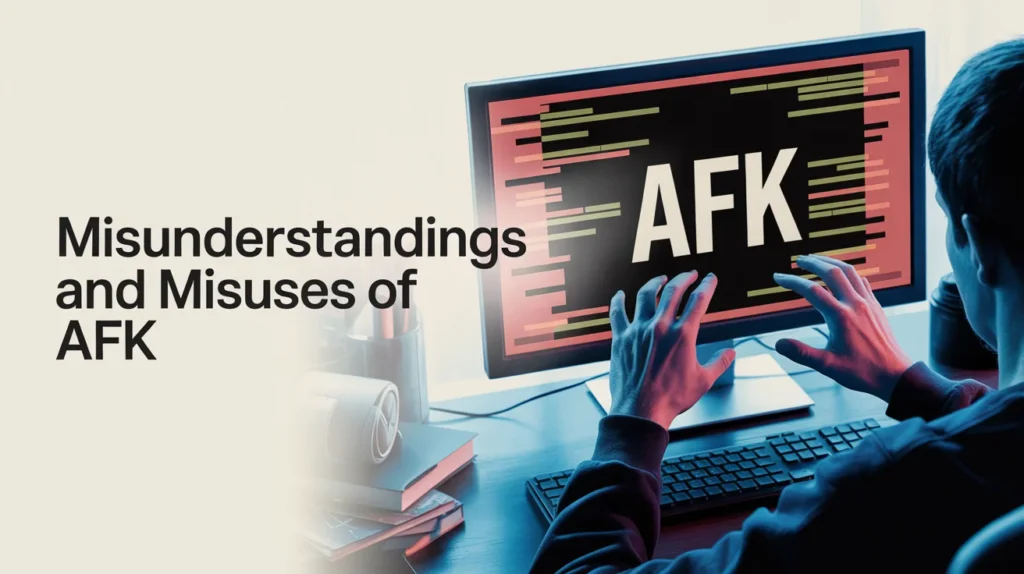Ever seen someone type “AFK” in a chat and wondered what it meant? Or maybe you’re in a game, and your teammate suddenly goes silent—just to return with “Sorry, I was AFK.” The term is short, but it carries a big role in the digital world.
In this complete guide, you’ll learn the true meaning of AFK, how and when to use it, where it came from, and why it’s a key part of online communication—whether you’re gaming, chatting, or working remotely.
What Does AFK Mean?
AFK stands for “Away From Keyboard”. It’s an internet slang acronym used to let others know that someone is temporarily unavailable or not actively using their computer or device.
It’s not a word you pronounce like “afk”—instead, you spell it out as A-F-K.
Here’s a quick breakdown:
| Term | Full Form | Meaning |
| AFK | Away From Keyboard | Temporarily unavailable or inactive |
| Use Case | Gaming, Messaging, Work | Signaling you’re stepping away |
In most cases, AFK is used in real-time digital environments like games, chatrooms, or messaging platforms to signal that you’re stepping away—but will be back shortly.
The Origin of AFK
The acronym AFK originated in the early 1990s, during the rise of internet relay chat (IRC) platforms and early online communities like Usenet.
How it started:
- IRC Chatrooms: Users would type “AFK” to inform others they were stepping away for a bit.
- Online Gaming: As multiplayer games like Ultima Online and EverQuest gained popularity, “AFK” became a practical shorthand.
- Forums & Messaging Apps: With the rise of AOL Instant Messenger and MSN, AFK became mainstream.
Fun fact: The earliest recorded use of AFK in chat logs dates back to 1991 in Usenet archives.
When and How to Use AFK

Knowing when to use AFK is more than just memorizing its meaning. It’s about understanding digital etiquette—and communicating with clarity.
In Online Gaming
Games move fast. So when a player suddenly stops responding, it can disrupt the whole team. Here’s how “AFK” is used in common games:
- League of Legends: “He’s been AFK since minute 5.”
- Fortnite: “Don’t drop him loot, he’s AFK.”
- World of Warcraft: “AFK for a bio break.”
Why it matters: Some games have penalties for being AFK too long—such as being auto-kicked or even banned.
In Messaging Apps (WhatsApp, Telegram, Discord)
You might send:
- “AFK for lunch. Ping me if it’s urgent.”
- “Going AFK for 15 mins, brb!”
In Workplaces and Remote Teams
On platforms like Slack, Teams, or Zoom:
- “AFK grabbing coffee—back in 10.”
- “Away from keyboard, leave your questions and I’ll check back soon.”
Pro Tip: In professional settings, it’s often better to combine “AFK” with an ETA (estimated time of return).
Common Variants and Related Terms
Let’s look at similar abbreviations often used alongside or instead of AFK:
| Term | Full Form | Difference |
| BRB | Be Right Back | Implies very short absence |
| BBL | Be Back Later | Longer absence than BRB |
| IDLE | Idle (not interacting) | Can be system-detected inactivity |
| IRL | In Real Life | Indicates offline context |
Example Scenario:
“Going AFK for 20, BRB in a bit—don’t start without me!”
Here, the speaker uses both AFK and BRB to add clarity and casual tone.
Why AFK Matters in Digital Culture
In a world where instant replies are expected, saying “AFK” is like raising your hand and saying, “Hey, I’m not ignoring you—I’ll be back soon.”
Why it matters:
- Improves communication clarity
- Shows respect for others’ time
- Reduces misunderstandings
It’s not just slang—it’s a tiny, powerful social signal in virtual spaces.
Misunderstandings and Misuses of AFK

Even a simple term like AFK gets misused at times. Here’s how:
Common Misuses:
- Using AFK without returning: This can irritate teammates or coworkers.
- Overusing AFK in professional contexts: It may seem too informal in formal chats.
- Using AFK as a joke during serious situations: Could appear disrespectful.
Tip: If you’re gone for more than a few minutes, specify your return time or switch to “BBL.”
AFK in Pop Culture and Memes
As with any widely used term, AFK has made its way into memes, videos, and social culture.
Examples:
- YouTube streamers: “AFK moment caught live!”
- Twitch chat: Spamming “AFK champ” when someone disappears midstream
- Reddit Gaming Threads: “This guy’s been AFK and we still won!”
Popular Meme Format:
“Friend: You good?
Me: AFK but spiritually present.”
It’s light-hearted, widely recognized, and often used humorously.
Real-World Examples of AFK Usage
Here are actual contexts where “AFK” is used daily:
Gaming Chat Log
markdown
CopyEdit
[Player1]: brb
[Player2]: you afk again bro?
[Player1]: just 2 mins, relax lol
Slack Work Chat
vbnet
CopyEdit
💬 Sarah: Need to step away for a sec, AFK for lunch!
💬 Mark: Sure, I’ll hold off till you return.
Discord Conversation
yaml
CopyEdit
🎮 John: AFK, gotta walk the dog.
🎮 Lisa: Roger that, we’ll wait.
These aren’t just examples—they’re slices of real digital life.
Should You Use AFK in Professional Settings?
The short answer? It depends on your company culture.
When it’s okay:
- Casual, informal work environments
- Team chats with close colleagues
- Internal channels where brevity is valued
When to avoid:
- Formal client-facing emails or discussions
- Legal, compliance, or sales correspondence
Alternative Phrases:
- “Stepping away for a moment”
- “Out for a quick break”
- “Away from my desk, back soon”
AFK Across Cultures and Languages
The beauty of acronyms like AFK is that they’re universally understood across digital platforms. But does it translate into other languages?
Global Usage:
- English-centric: Used as-is in most non-English speaking gaming/chat communities
- Local Alternatives: Some languages may have their own phrases, but AFK remains widely recognized
Example:
- French forums: Users still write “AFK” instead of “loin du clavier”
- Japanese gaming chats: AFK is common even with native scripts
AFK in Technology and Software
Auto-Detect AFK Features
Many platforms today are designed to recognize AFK behavior automatically:
| Platform | Feature | Purpose |
| Discord | “Idle” status after inactivity | Signals away status to others |
| Online Games | AFK detection systems | Kicks inactive players |
| Time Tracking Apps | Detect mouse/keyboard inactivity | Log time spent away |
Popular Software That Uses AFK Detection:
- Toggl Track
- Hubstaff
- League of Legends / Valorant (AFK ban systems)
Real Impact: Some competitive games ban users for repeated AFK behavior to maintain fairness.
AFK FAQs
Is AFK rude to use?
Not at all—when used properly. It’s considered good netiquette to signal you’re stepping away.
Can you be banned for being AFK in games?
Yes. Many multiplayer games penalize persistent AFK behavior with warnings, timeouts, or bans.
Is AFK only for gaming?
No. It’s used in messaging apps, work chats, forums, and more.
Can AFK be used humorously?
Definitely. Many people say “AFK spiritually” or “AFK from life” jokingly.
Final Thoughts
AFK may be a small acronym, but it plays a big role in our fast-moving digital world. Whether you’re in a competitive game or just messaging a friend, using AFK responsibly shows respect for others and keeps communication flowing.
Quick Recap:
- AFK = Away From Keyboard
- Common in gaming, chat, and remote work
- Use it when you step away temporarily
- Be mindful of when and where you use it
- It’s a signal of respect, not just a status
So next time you step away from your screen, don’t ghost. Just type “AFK”—and come back soon.















